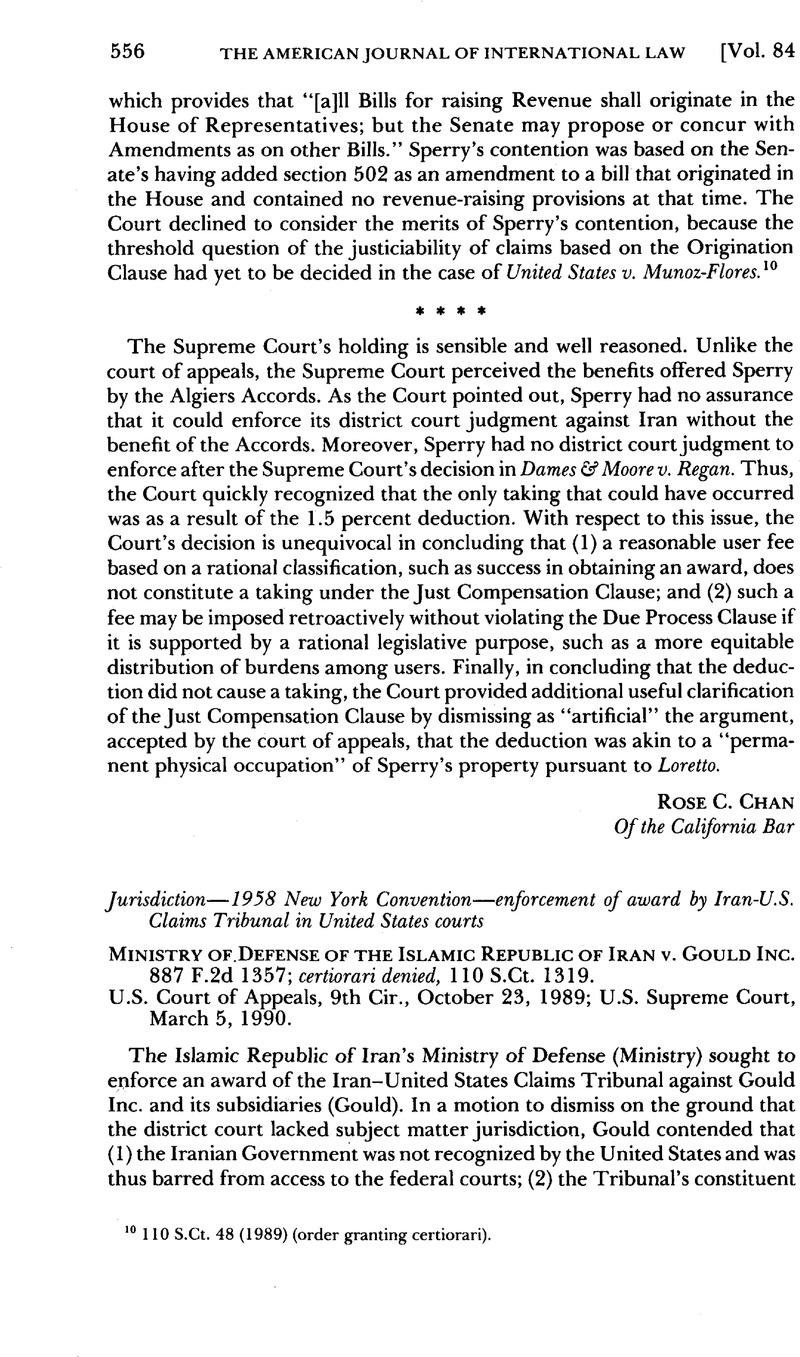No CrossRef data available.
Published online by Cambridge University Press: 27 February 2017

1 The Algiers Accords include the (1) Declaration of the Government of the Democratic and Popular Republic of Algeria (Jan. 19, 1981) (the General Declaration), and (2) Declaration of the Government of the Democratic and Popular Republic of Algeria Concerning the Settlement of Claims by the Government of the United States of America and the Government of the Islamic Republic of Iran (Jan. 19, 1981) (the Claims Settlement Declaration), both reprinted in Dep’t St. Bull., No. 2047, February 1981, at 1, and 1 Iran-U.S. Claims Tribunal Reports [hereinafter Iran-U.S. C.T.R.] 3 (1983).
2 Convention on the Recognition and Enforcement of Foreign Arbitral Awards, June 10, 1958, 21 UST 2517, TIAS No. 6997, 330 UNTS 38 [hereinafter New York Convention or Convention].
3 Exec. Order No. 12,294, 3 C.F.R. 139 (1981). See also Dames & Moore v. Regan, 453 U.S. 654 (1981) (upholding the President’s authority to issue that order).
4 The Tribunal had earlier decided that a counterclaim for an amount in excess of that sought by the claimant was within its jurisdiction. Gould Marketing, Inc. and Ministry of National Defense, ITL 24–49–2 (July 27, 1983), reprinted in 3 Iran-U.S. C.T.R. 147, 151–52 (1983 II), summarized in 77 AJIL 893 (1983).
5 See Islamic Republic of Iran and United States (Case A21), Dec. 62–A/21–FT (May 4, 1987), reprinted in 14 Iran-U.S. C.T.R. 324, 330–31 (1987 I) (confirming that automatic payment from the Security Account, created by the Algiers Accords, was unavailable to Iran, but that the United States had an obligation “to provide some procedure or mechanism whereby enforcement may be obtained within its national jurisdiction, and to ensure that the successful Party has access thereto”).
6 887 F.2d 1357, 1362.
7 This condition was attached by the United States as a reservation to its accession to the Convention, supra note 2. See 21 UST at 2566, reprinted in notes following 9 U.S.C.A. §201.
8 The question of Iran’s access to the courts of the United States was not certified on appeal. 887 F.2d at 1361 n.7. The issue of federal question jurisdiction based on the self-executing nature of the Algiers Accords, raised in the Ministry’s cross-appeal, was not reached because of the holding of jurisdiction based on the Federal Arbitration Act. 887 F.2d at 1366. But see Islamic Republic of Iran v. Boeing Co., 771 F.2d 1279, 1283–84 (9th Cir. 1985) (which held that the Accords are not self-executing).
9 See Convention, supra note 2, Art. 2, para. 1 (“Each Contracting State shall recognize an agreement in writing under which the parties undertake to submit to arbitration all or any differences . . . between them in respect to a defined legal relationship, whether contractual or not, concerning a subject matter capable of settlement by arbitration”); and id., Art. 5, para. 1(a).
l0 887 F.2d at 1364.
11 Convention, supra note 2, Art. 5, para. 1(e).
12 See 887 F.2d at 1365. The panel also cited a decision of the Hoge Raad (Supreme Court) of the Netherlands, which held that review of an award under national law is necessary only when one of the grounds for setting it aside has been shown and reference to national law is required to evaluate that ground. The Hoge Raad thus confirmed that anational awards are enforceable, but could be challenged on the remaining grounds specified in Article V. See Société européenne d’entreprises v. Socialist Fed. Republic of Yugoslavia, 1974 Nederlandse Jurisprudence [N.J.], No. 361 (H.R. 1973), summarized in 5 Neth. Y.B. Int’l L. 290, 295 (1974), modified on other grounds, 1976 N.J., No. 274 (H.R. 1975), summarized in 7 Neth. Y.B. Int’l L. 349 (1976).
13 See, e.g., Lewis, What Goes Around Comes Around: Can Iran Enforce Awards of the Iran-U.S. Claims Tribunal in the United States?, 26 Colum. J. Transnat’l L. 515, 545–46 (1988); and sources cited in Gould, 887 F.2d at 1363 n.9.
This point was made in Dallal v. Bank Mellat, a 1985 British High Court decision that the Ninth Circuit took pains to explain, and that had held that Tribunal decisions operated as res judicata. 1986 Q.B. 441, 460–61, [1986] 1 All E.R. 239, 254 (Hobhouse, J.) (“[A] person can make . . . a tribunal competent by voluntarily resorting to it. . . . Dallal chose to resort to the Hague tribunal, and thereby submitted to its jurisdiction; it is not now open to him to say that it was incompetent”).
14 See A. J. Van den Berg, The New York Arbitration Convention of 1958: Towards A Uniform Judicial Interpretation 170–232 (1981).
15 See, e.g., id. at 28–43.
16 See Lewis, supra note 13, at 548–51; Lake & Dana, Judicial Review of Awards of the Iran– United States Claims Tribunal: Are the Tribunal’s Awards Dutch?, 16 Law & Pol’y Int’l Bus. 755, 792–805 (1984) (identifying commentators who support the court’s conclusion and citing municipal decisions to that effect).
17 Cf. Convention, supra note 2, Art. 5, para. 1(e). The possibility that Tribunal awards can be successfully challenged in Dutch courts is not settled. See Lake & Dana, supra note 16, at 759–82. See also Caron, The Nature of the Iran-United States Claims Tribunal and the Evolving Structure of International Dispute Resolution, 84 AJIL 104 (1990), who argues that they can be. To date, none has been. See 10 Y.B. Com. Arb. 181 (1985).
18 See Lewis, supra note 13, at 516 n.9.